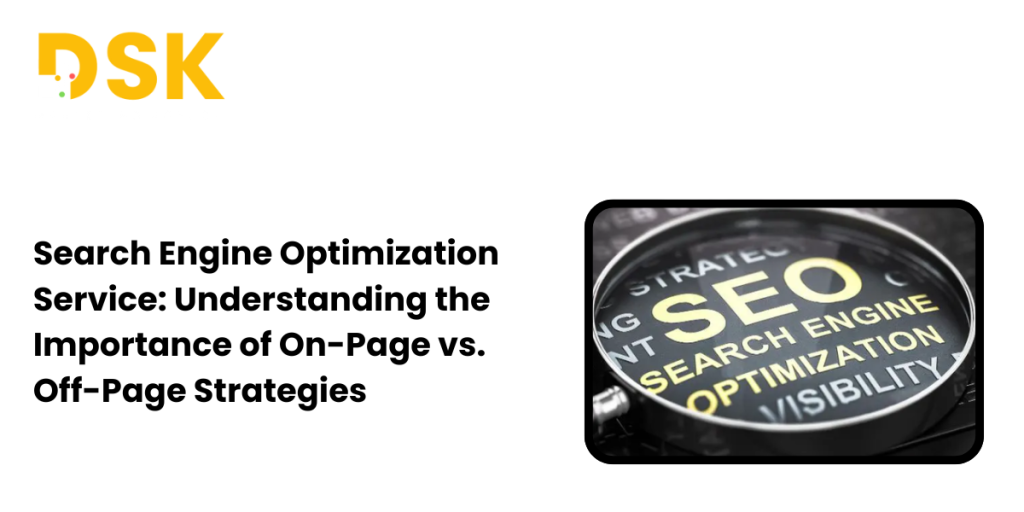The search engine optimization service is divided into on-page and off-page optimizations. Both strategies are essential to attaining a higher ranking on the search engine result page, but they are different.
Through on-page optimization, you can optimize website parts that are under your control. With off-page optimization, you can increase your website’s credibility through content creation and earning backlinks.
Let’s get started by learning about both on-page and off-page strategies and how to use search engine optimization techniques.
On-page vs off-page: Know the difference
If explained, what you rank for depends on the on-page SEO, and how high you can rank will depend on the off-page strategy.
On-Page SEO and its Importance for Engine Optimization Service
You are in charge of several website features. These elements include things like title tags, keywords, page speed, optimized content, and accessibility to the website. To improve a website’s ranking, on-page optimization entails optimizing each of these elements and making the necessary adjustments. Your website can function at peak efficiency and get a higher search engine ranking with the help of efficient search engine optimization service.
On-page checklist
Title tags: You must incorporate relevant keywords in each page’s title tags. Below are some of the best practices for writing an effective title tag
- Keep the word limit between 55 and 60 characters
- Keep the keyword close to the beginning of the title tag.
- Avoid keyword stuffing
Headings (H1): With a bigger font, search engines give more weight to headings than any other content. Hence, you must insert your target keyword in the heading and ensure the rest of the content is high quality.
One page should contain only one H1; the other headings should be H2 and H3.
Alt text for images: You must add alt text to all your website images. This text is not visible to visitors, but the search engine identifies this text while crawling. Hence, inserting relevant keywords in the images will allow search engines to understand your page content properly.
Also, writing alt text for all your images will keep you compliant with WCAG (Web Content Accessibility Guidelines). Keep the below points in mind while writing alt-text
- Describe the image in 8–10 words
- Naturally, insert the target keywords.
Page loading speed: Google wants its users to find what they want as early as possible for a better user experience. Hence, it prefers websites with fast loading speeds. Google has a tool called PageSpeed Insights that checks your website’s speed on both desktop and mobile.
Mobile-friendliness
As most users now check websites through mobile devices, Google has started giving preference to mobile-friendly websites. You can check your website’s mobile friendliness using the Google Search Console.
Page Content
Your website content should be helpful for visitors. If they have visited your website to learn more about your business, they must be able to get the relevant information quickly. The content should be easy to understand and give value to the visitors. Google has various ways to check the quality of your content.
- Post at least 500 words of content on the web page. Although there is no rule of word count to be present on the website, Google prefers the website to contain high-quality and informative content.
- Your content should be unique and not copied from any other websites. It should answer all the queries of the visitors.
- Keep the keyword at the beginning of the title, but it should come naturally.
Internal Linking: Enhancing Your Search Engine Optimization Service
Linking the content with other internal pages of your website is helpful for both search engines and visitors. While interlinking ensures proper anchor text, an anchor text should be well-optimized, and to do so, you must choose the phrase or word relevant to the page you are linking.
Off-Page SEO: A Vital Search Engine Optimization Service
Off-pageOff-page SEO is all about getting links from other websites and increasing your domain’s credibility. An excellent example of off-page SEO working is this. If you fill a bathtub with rubber duckies (ducks are your web pages) and start filling the tub with water (links), your duckies will automatically reach the top.
Wikipedia also works on the same strategy. They have filled their bathtub with so much water that even if they add more duckies, they will float on top without making any effort.
How to optimize the website for off-page SEO
Various factors can influence your off-page ranking. Although multiple strategies exist to handle each factor, each strategy shares the same goal: building your website’s reputation and trust from the outside.
The whole story of off-page revolves around getting quality backlinks. Below are some of the examples through which you can get links for your website:
- Create informative content that can compel users to link to it. For example, you can write about ‘How to Write Effectively About Us Page’ or anything else most people want to know.
- Share content on social media, and from there, you can get the backlinks.
- Outreach e-mails to influencers from where you can get the links.
- Do guest blogging.
Always remember that link quality is more important than link quantity. Hence, it would help if you had valuable links to improve your off-page SEO.
Which one is more powerful, on-page vs. off-page?
You don’t have to choose between these two; both are important and mandatory for better website ranking. However, SEO professionals focus on search engine optimization (on-page optimization) before moving towards off-page optimization. It is like focusing on the foundation before building the house and moving towards the rest.
Like your house, you need to maintain your on-page SEO periodically. Balance both strategies to make the website suitable for users and search engine crawlers.
From the above blog, you have understood the importance of SEO for your website. You can also hire a search engine optimization service to do this work for you.
These professionals are aware of all such tactics and Google updates. They can also conduct a search engine optimization audit within a specific time frame to ensure your website follows all Google norms.

